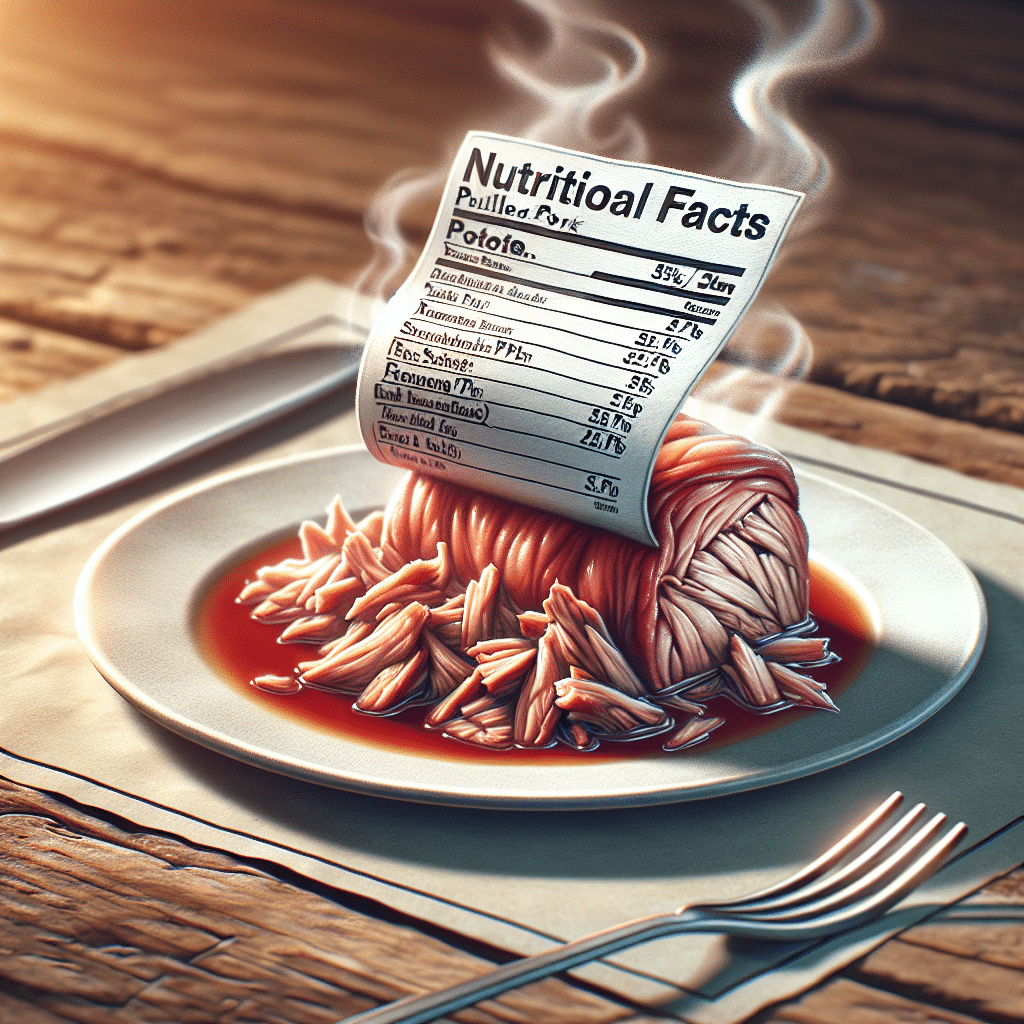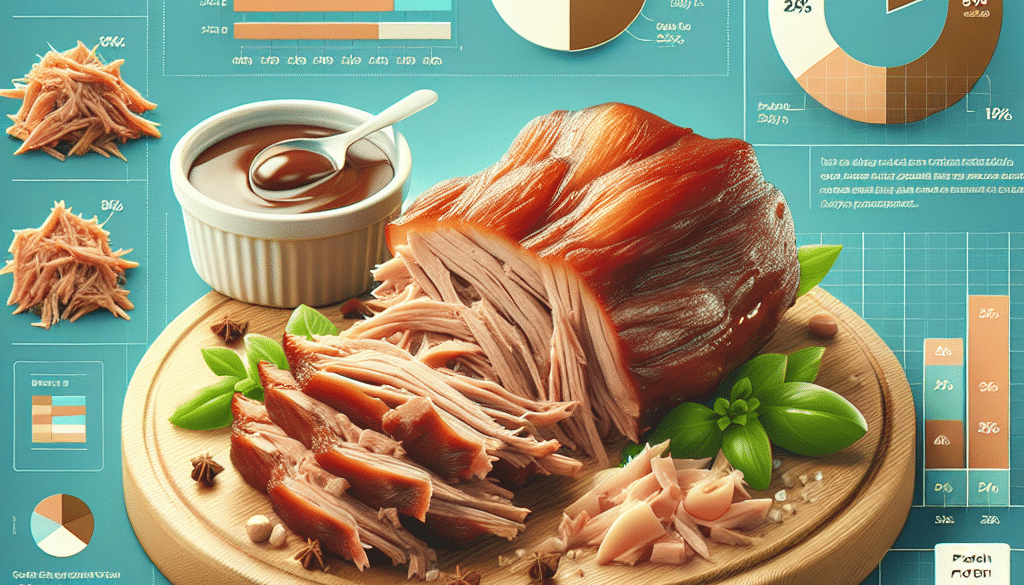Pulled Pork Protein Content: Savory Nutritional Facts
-
Table of Contents
- Pulled Pork Protein Content: Unveiling Savory Nutritional Facts
- Understanding Protein in Pulled Pork
- Protein Content Breakdown
- Factors Affecting Protein Content
- Nutritional Profile of Pulled Pork
- Vitamins and Minerals
- Fat Content and Considerations
- Health Benefits of Protein from Pulled Pork
- Integrating Pulled Pork into a Balanced Diet
- Conclusion: The Protein Power of Pulled Pork
- Discover ETprotein’s Plant-Based Protein Alternatives
Pulled Pork Protein Content: Unveiling Savory Nutritional Facts

When it comes to savory comfort food, few dishes are as beloved as pulled pork. Known for its tender texture and rich flavor, pulled pork is a staple at barbecues and family gatherings. But beyond its delicious taste, pulled pork is also a valuable source of protein. In this article, we’ll delve into the protein content of pulled pork and explore the nutritional benefits it offers, making it more than just a tasty treat.
Understanding Protein in Pulled Pork
Protein is an essential macronutrient that plays a critical role in building and repairing tissues, producing enzymes and hormones, and supporting immune function. Pulled pork, which comes from the shoulder of the pig, is packed with high-quality protein that contains all nine essential amino acids required by the human body.
Protein Content Breakdown
The protein content in pulled pork can vary depending on how it’s prepared and served. On average, a 3-ounce serving of cooked pulled pork contains about 18-25 grams of protein. This amount can contribute significantly to the daily recommended intake of protein, which is 46 grams for women and 56 grams for men, according to the Dietary Guidelines for Americans.
Factors Affecting Protein Content
- Cooking Method: The way pulled pork is cooked can influence its protein content. Slow-cooking methods tend to preserve protein better than high-temperature cooking.
- Marination: Ingredients used in marination can add to the protein content, especially if dairy or soy products are used.
- Serving Size: Larger portions will naturally contain more protein, but it’s important to balance portion size with overall caloric intake.
Nutritional Profile of Pulled Pork
While protein is a key nutrient in pulled pork, it’s not the only one. Pulled pork also contains various other nutrients that contribute to a balanced diet.
Vitamins and Minerals
Pulled pork is a good source of essential vitamins and minerals, including:
- Vitamin B6 and B12, which are important for energy metabolism and brain health.
- Niacin, which supports the digestive system, skin, and nerves.
- Iron, which is crucial for oxygen transport in the blood.
- Zinc, which is important for immune function and wound healing.
- Phosphorus, which plays a role in the formation of bones and teeth.
Fat Content and Considerations
It’s important to note that pulled pork can also be high in fat, particularly saturated fat. The fat content can increase depending on the cut of meat and preparation methods. To maintain a healthy diet, it’s advisable to balance the intake of pulled pork with leaner protein sources and to monitor portion sizes.
Health Benefits of Protein from Pulled Pork
Consuming adequate protein is vital for maintaining good health, and pulled pork can be a part of this. Here are some health benefits associated with the protein in pulled pork:
- Muscle Maintenance: Protein is essential for muscle growth and repair, making pulled pork a great option for athletes and those looking to maintain muscle mass.
- Weight Management: Protein-rich foods like pulled pork can increase satiety, helping to reduce overall calorie intake and support weight management.
- Improved Metabolism: A higher protein intake can boost metabolism and increase the number of calories burned throughout the day.
Integrating Pulled Pork into a Balanced Diet
While pulled pork is a protein-rich food, it’s important to consume it as part of a balanced diet. Here are some tips for incorporating pulled pork into your meals:
- Pair it with whole grains and vegetables to create a well-rounded meal.
- Use healthier cooking methods, such as slow-cooking or baking, to reduce added fats.
- Opt for homemade sauces and rubs to control the amount of sugar and salt.
- Choose leaner cuts of pork, such as the tenderloin, to reduce saturated fat intake.
Conclusion: The Protein Power of Pulled Pork
In conclusion, pulled pork is not only a mouthwatering dish but also a substantial source of high-quality protein. Its rich nutritional profile, including essential vitamins and minerals, makes it a valuable addition to a balanced diet. However, it’s important to consider the fat content and to consume it in moderation as part of a varied meal plan. By understanding the savory nutritional facts of pulled pork, you can enjoy this classic comfort food while also reaping its health benefits.
Discover ETprotein’s Plant-Based Protein Alternatives
If you’re looking for plant-based protein options to complement or substitute for pulled pork in your diet, ETprotein offers a range of high-quality vegan protein products. Their organic and non-GMO protein powders, including rice, pea, and seed-based proteins, provide excellent alternatives for those seeking diverse sources of protein. Whether you’re formulating new food products or simply aiming to enhance your personal nutrition, ETprotein’s offerings can meet your needs.
About ETprotein:
ETprotein, a reputable plant protein vegan protein Chinese factory manufacturer and supplier, is renowned for producing, stocking, exporting, and delivering the highest quality organic bulk vegan protein and plant proteins. They include Organic rice protein, clear rice protein, pea protein, clear pea protein, watermelon seed protein, pumpkin seed protein, sunflower seed protein, mung bean protein, peanut protein etc. Their offerings, characterized by a neutral taste, non-GMO, allergen-free attributes, cater to a diverse range of industries. They serve nutraceutical, pharmaceutical, cosmeceutical, veterinary, as well as food and beverage finished product distributors, traders, and manufacturers across Europe, USA, Canada, Australia, Thailand, Japan, Korea, Brazil, and Chile, among others.
ETprotein specialization includes exporting and delivering tailor-made protein powder and finished nutritional supplements. Their extensive product range covers sectors like Food and Beverage, Sports Nutrition, Weight Management, Dietary Supplements, Health and Wellness Products, and Infant Formula, ensuring comprehensive solutions to meet all your protein needs.
As a trusted company by leading global food and beverage brands and Fortune 500 companies, ETprotein reinforces China’s reputation in the global arena. For more information or to sample their products, please contact them and email sales(at)ETprotein.com today.












